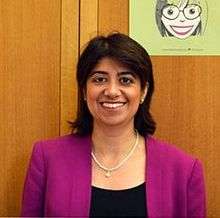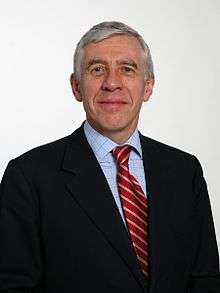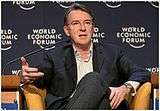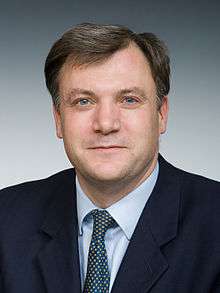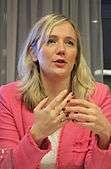Young Fabians
Young Fabians | |
|---|---|
 | |
| Chairperson | Ellie Groves |
| Vice-Chair | Ria Bernard |
| Treasurer | Kyalo Burt-Fulcher |
| Secretary | Kuba Stawiski |
| Editor of Anticipations | Charlotte Norton |
| Founded | 1960 |
| Headquarters | London, United Kingdom |
| Membership | 1800 |
| Type | Think tank |
| Purpose | The Young Fabians are the under-31's section of the Fabian Society |
| Website | |
|
www | |
The Young Fabians is the under 31 years of age section of the Fabian Society,[1] a socialist society in the United Kingdom. The Young Fabians operate as a membership-driven think tank that organises policy debates, research projects, publications, conferences and international delegations. The organisation holds no collective position on policy.
History
The Fabian Society was founded by a group of young idealists in the late 19th century[2] (see Fabian Society entry for full details). For example, H. G. Wells was 27 when he joined the Committee as was George Bernard Shaw. However, by the middle of the 20th century, the average age of active members was relatively elderly. In order to encourage more young people to join the society, a Young Fabian Group was proposed.
The Young Fabian Group for members of the Fabian society 30 years of age or younger was officially convened in May 1960 at a meeting organised by Fabian Society assistant General Secretary, Richard Leonard.
From small beginnings, the Young Fabians produced a steady stream of pamphlets through the 1960s and 1970s, and produced some 50 by 1980.[3]
The Young Fabians became less prominent during the 1980s while the Labour Party re-organised its youth wing, partly based on a template set out in a Young Fabian pamphlet.
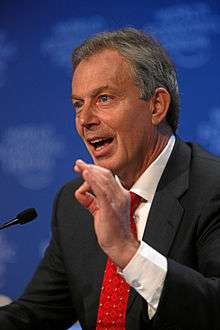
However, in the early 1990s, the group underwent a revival and played an important role in the discussion of the next stage of modernisation within the Labour Party. In 1994, members of the Young Fabians were part of the campaign to elect Tony Blair leader of the party and then the campaign to change Clause IV, although the group itself took no formal position on these issues.
In recent years several controversial pamphlets have been produced including "Students as citizens" which advocated granting more choice to university students and "The Case for Socialism" which set out the socialist themes and actions of the Government of Tony Blair. In 2014 pamphlet number 63 One Nation was launched, which examined Ed Miliband vision for Britain. The most recent pamphlet, number 65 Closing the Gap, explores how the Labour Party can remould the NHS to ensure it is fit face the new challenges of an ageing population.
The Group's quarterly magazine Anticipations, named after the title of an essay by H. G. Wells, was founded in 1996. It was originally edited by Liam Byrne, Tom Happold, Mark Leonard (director) and Emma Beswick.
Until 2015 the organisation's activities were run directly by its Executive Committee, which undertook a programme of speaker events, seminars, receptions and policy pamphlets. This was changed fundamentally with the adoption of a new constitution in 2015 after a campaign led by then National Chair Alex Adranghi and the following Chair Martin Edobor. Since then focus of running programmes have been devolved to members directly.
The Young Fabians are currently seeking affiliation to Young European Socialists (YES)
Political position
The Young Fabians' statement of purpose is to avoid commitment to any one brand of socialism and to provide a "forum for different points of view within the left".
Unlike other youth socialist groups, the Young Fabians has maintained this position of neutrality on policy issues, upholding the Fabian Society principle that its role is merely to determine whether a matter or position is suitable for discussion, not to take a group position on an issue. This has helped the group survive through many changes in the Labour Party without being identified as part of the left or right wing factions.
Along with the Fabian Society the Young Fabians is affiliated to the Labour Party. The group officially maintain a policy of neutrality with decisions internal the Labour Party such as internal elections. The group has the right to appoint one member to the Executive Committee of Young Labour.
Full members of the group must not be members of political parties that oppose Labour. A significant minority of members do not hold membership of the Labour Party. Members of other political parties are able to join the group as associate members.
The importance of the Young Fabians

The book The Modernisers' Dilemma cites the Young Fabians as one of the most important groups within the Labour Party. As an organised network of younger, generally well-educated party members, often researchers or academics, the Young Fabians is one of the main social and informal networks through which political activity is carried out. However, by taking no formal policy stance, the Young Fabians has been able to include both supporters and sceptics of past Labour Governments.
The Young Fabians also fills the gap between student politics and mainstream Labour Party politics, a gap which is filled in the Liberal Democrat and Conservative Party structures by having youth wings which include graduates up to the age of 30.
Young Fabian alumni
Young Fabian alumni have played significant roles in British public life, with many entering the British parliament and holding offices of state. Young Fabian alumni include: Professor Colin Crouch,[4] Brian Lapping, Howard Glennerster, Giles Radice, Conrad Russell, Michael Crick, Peter Mandelson, Jack Straw, Stephen Twigg, Ann Taylor, Vince Cable[5] John Mann, Phil Woolas, Oona King, Lorna Fitzsimons, Paul Richards, Tom Watson, Liam Byrne, Stella Creasy, Seema Malhotra, Sunder Katwala, Mark Leonard (director), Jessica Asato, Sara Ibrahim.
|
The Young Fabians today
Since 1994, the Young Fabians has grown to more than 1,500 members. It currently holds a series of events including policy seminars, debates and receptions in foreign embassies, recent campaigning visits to Ohio for the 2008 Presidential election and Sweden for the 2010 and 2014 general election, and publishes the quarterly magazine Anticipations. The Young Fabians are distinct from other youth movements in their focus on ideas and policy. Like the Fabian Society, the Young Fabians promote the discussion and dissemination of ideas to help shape Labour Party policy. It also holds regular social events and the annual boat party on the Thames has become a popular fixture in the Westminster calendar.
The Young Fabians Networks

In 2010 the Young Fabians launched two special interest groups focused on Finance and Science industries. These networks set out to bring together those involved or who have an interest in the subject, and link their specialist knowledge into policy debate. In 2011 a third Health Network was launched. In 2013 saw the brief existence of Foreign Policy and Creative Industry Networks and in 2014 a Local Government Network was intended to open. 2015 saw the largest expansion of networks with founding of Education, International and Communications network, followed by further addition of the Law and Technology networks in 2016. Each network is run by a steering committee who manage their own annual programme, and since 2012 the networks have elected their own Chairs and other officers.
| Year | Finance Network | Health Network | International Network | Education Network | Communications Network | Technology Network | Law Network |
|---|---|---|---|---|---|---|---|
| 2011-2012 | Alexander Adranghi | Martin Edobor | - | - | - | ||
| 2012-2013 | Lorna Russell | Adebusuyi Adeyemi | - | - | - | ||
| 2013-2014 | Sophie Robson | Amrita Rose | - | - | - | ||
| 2014-2015 | Joshua Price | Sophie Keenleyside | Luke John Davies | Joel Mullan | Camilla Clarke | ||
| 2015-2016 | Vickram Grewal | Rose Gray | Christos Gatsios | Channon Zhangazha | Junaed Khan | Nick Maxwell | Rebecca Meredith |
Young Fabians Executive
The Executive of the Young Fabians are elected in the run up to the November AGM and hold office for one year. Recent Executives and Chairs have included:
| Year | Chair | Elected |
|---|---|---|
| 1993-1994 | Katherine Edwards | |
| 1994-1995 | Darren Kalynuk | |
| 1995-1996 | Emma Beswick | |
| 1996-1997 | Tom Happold | |
| 1997-1998 | Peter Metcalfe | |
| 1998-1999 | Howard Dawber | |
| 1999-2000 | Seema Malhotra | |
| 2000-2001 | Mari Williams | |
| 2001-2002 | Guy Lodge | |
| 2002-2003 | James Connal | |
| 2003-2004 | Jessica Asato | |
| 2004-2005 | Kevin Bonavia | |
| 2005-2006 | Prema Gurunathan | Conor McGinn, Tom Flynn, Kate Groucutt, Mark Rusling, David Floyd, Emma Carr, Emily Robinson, Matt Blakeley, Nisha Tailor, Fred Grindrod, Rebecca Rennison |
| 2006-2007 | Conor McGinn | Kate Groucutt, Tom Flynn, Emma Carr, Mark Rusling, Will Martindale, David Floyd, Fred Grindrod, Yue Ting Cheng, Angela Green, Nisha Tailor, Rebecca Rennison |
| 2007-2008 | Mark Rusling | Kate Groucutt, Rebecca Rennison, Emma Carr, David Chaplin, Patrick Woodman, Alex Baker, Tom Miller, Dan Whittle, Tom Flynn, Brian Tomlinson, Richard Messingham |
| 2008-2009 | Kate Groucutt | Emma Carr, David Chaplin, Rebecca Rennison, Richard Messingham, Dan Whittle, Adrian Prandle, Tom Stote, Alex Baker, Sam Strudwick, Claire Leigh, James Green |
| 2009-2010 | David Chaplin | Adrian Prandle, Sara Ibrahim, Alex Baker, James Green, Rebecca Rennison, Preth Rao, Steve Race, Claire Leigh, Brian Duggan, Anna-Joy Rickard |
| 2010-2011 | Adrian Prandle | Sara Ibrahim, Claire Leigh, Alex Baker, James Green, Vincenzo Rampulla, Marie-Noelle Loewe, Preth Rao, Brian Duggan, Anna-Joy Rickard, Richard Lane |
| 2011-2012 | Sara Ibrahim | Claire Leigh, Steve Race, Hetty Wood, Ellie Cumbo, Katharina Klebba, James Hallwood, Matt Zarb-Cousin, Jack Storry, Vincenzo Rampulla, James Roberts, Brian Duggan |
| 2012-2013 | Steve Race | Hetty Wood, Ellie Cumbo, Katharina Klebba, Louie Woodall, Thomas Butler, Alex Adranghi, Colm Flanagan, Graeme Henderson, James Hallwood, Joel Mullan, Marielle O'Neill |
| 2013-2014 | James Hallwood | Katharina Klebba, Alex Adranghi, Martin Edobor, Louie Woodall, Hetty Wood, Joel Mullan, Adebusuyi Adeyemi, Alvin Carpio, Felicity Slater, Lorna Russell. |
| 2014-2015 | Alexander Adranghi | Martin Edobor, Adebusuyi Adeyemi, Sophia Morrell, Paulina Jakubec, Ellie Groves, Heather Vernon, Louie Woodall, Alvin Carpio, Jess Toale, Ben West, Sophie Keenleyside. |
| 2015-2016 | Martin Edobor | Ria Bernard, Ellie Groves, Ben West, Unsa Chaudri, Miriam Mirwitch, Bradley Marshall, Andrea Campos-Vigouroux, Ade Adeyemi, Amrita Rose, Babs Williams, Kyalo Burt-Fulcher, Luke John Davies. |
| 2016-2015 | Ellie Groves | Ria Bernard, Ben West, Jack Phipps, Miriam Mirwitch, Kyalo Burt-Fulcher, Jade Symonds, Kuba Stawiski, Emma Booth, Rebecca Meredith, Kirith Ahluwalia, Charlotte Norton, Nathaneal Amos-Sansam, Luke John Davies. |
See also
- Fabian strategy
- Gradualism
- Keir Hardie
- Labour Research Department
- List of UK think tanks
- Reformism
- Social democracy
- Fabian Society
- Democratic socialism
- Ethical movement
Young Fabian Press
- Anticipations – Print magazine of the Young Fabians
- Anatomy – Policy project-centric serial
See also
External links
References
- ↑ The Guardian (2013). "Politics Special Reports". r/ The Guardian.
- ↑ >>Margaret Cole (1961). The Story of Fabian Socialism. Stanford University Press. ISBN 978-0804700917.
- ↑ >>The London School of Economics (1961–2009). "LSE Fabian Society and Young Fabian digital archives". r/ The Fabian Society.
- ↑ >>Colin Crouch (1969). "Politics in a Technological Society". r/ The Fabian Society.
- ↑ >>Vince Cable (1969). "Whither Kenyan Emigrants". r/ The Fabian Society.
